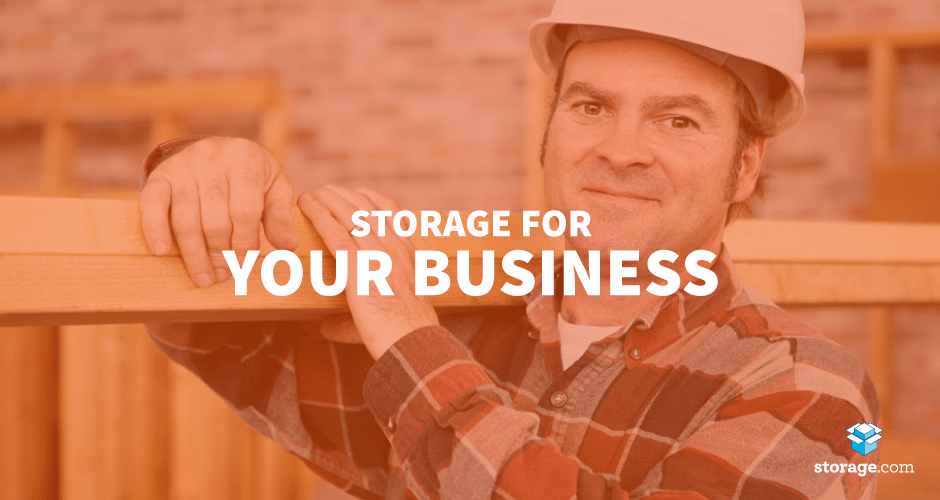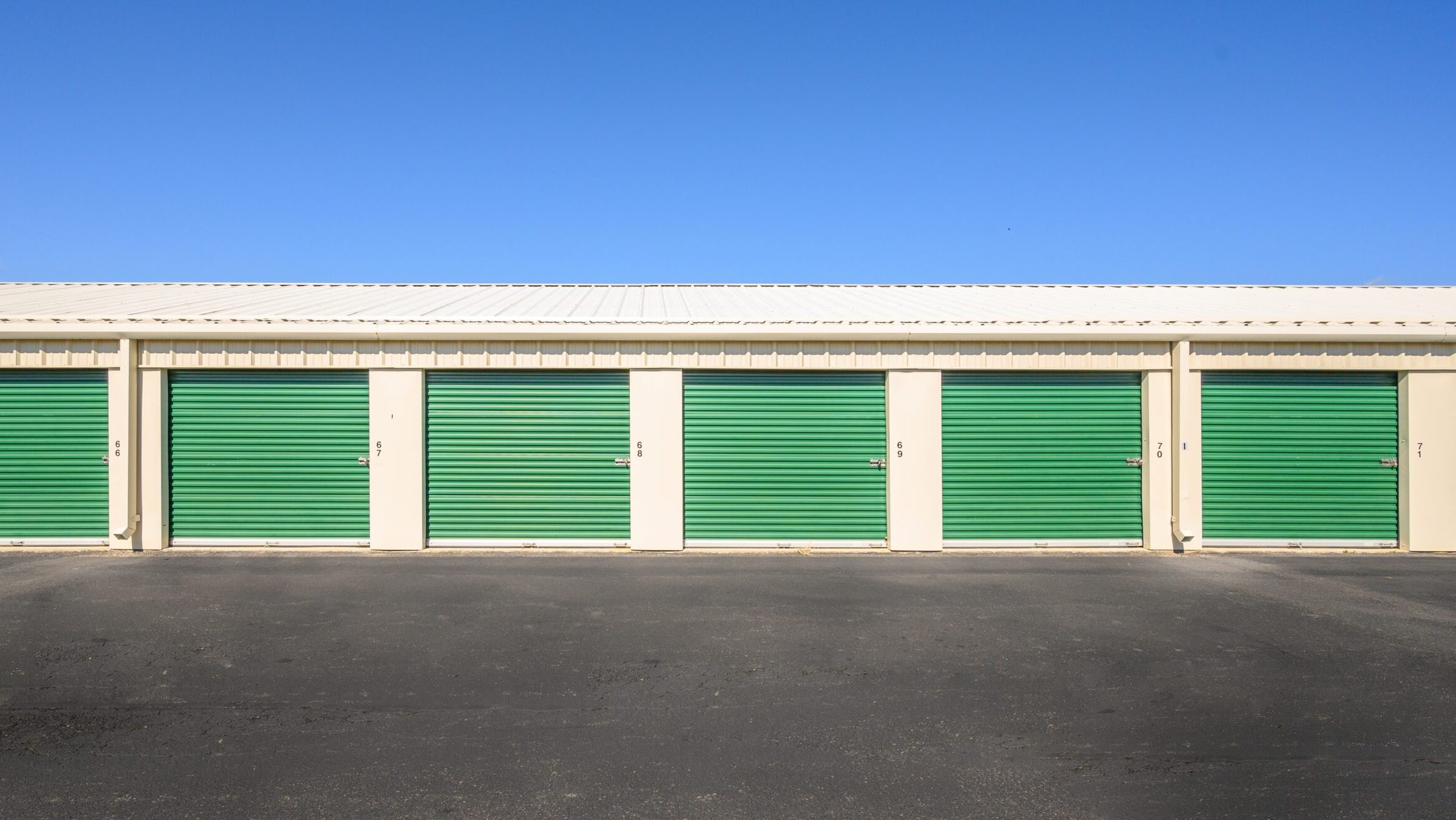Looking for the perfect spot to stash your business stuff? It’s a jungle out there with options ranging from units the size of a closet to warehouse storage for small businesses and outdoor spaces big enough for a fleet.
Whether your office is bursting at the seams with paperwork, your inventory is taking over or you just need a safe place for the company van, there’s a business storage solution with your name on it. Let’s figure out together which of these types of business storage solutions check all your business needs.
1. Self-Storage Units
You may think of self-storage units as just a place for stashing away old college textbooks or holiday decorations. The good news is businesses, big and small, can find these individual units at storage facilities incredibly useful.
Since they come in sizes that can range from a small closet to a large garage, you’ll get the flexibility and space you need for your business, whether it’s a stack of financial documents, surplus inventory or extra office equipment and furniture.
And if you’ve got sensitive items, just opt for a climate-controlled unit that keeps the temperature and humidity just right.
Who should choose self-storage units?
Given the flexibility to scale up or down as your business needs change, commercial storage units are perfect for:
- small businesses looking for a cost-effective storage solution;
- e-commerce retailers with fluctuating inventory levels; and
- service providers needing flexible, accessible space for equipment or documents.
Related Content: 10 Businesses That Benefit from Using Self-Storage
2. Warehouse Storage
As you may have guessed, warehouses aren’t your average storage space. They’re massive open areas tailor-made for holding large quantities of goods.
From shelving units to pallets, your items will be organized in a way that makes sense for your business and you can expect a warehouse storage provider to offer you extra perks like packing, shipping and inventory management to streamline your operations. In fact, you could call them inventory storage facilities.
Who should choose warehouse storage?
Since warehouse storage means committing to a longer lease, which could be a hefty investment both in time and money, you should consider it if your business has a steady flow of products and a clear need for extensive storage and logistical support.
This doesn’t mean that warehouse storage for small businesses isn’t feasible. It’s a substantial commitment but one that can pay off in terms of organization, efficiency and capacity to handle a growing demand.
3. On-Site Storage Containers
How about having your very own warehouse right where you need it most? At your business site. Mobile storage units for businesses are typically tough, weather-resistant and come in sizes that fit just about any need you could imagine, much like a Swiss Army knife for business storage, if you will.
What makes them so handy is you can place them right on your business site, giving you instant access to tools, materials, extra inventory or whatever else you need during the working day.
All you have to do is choose the size that fits your current and future needs, and if you need more than one, that’s not an issue as long as you have a parking spot for it. That’s great flexible storage for startups right there.
Who should get on-site storage containers?
Having everything on-site means no waiting around for deliveries or running back to storage facilities. That makes mobile storage units for businesses a gold mine especially if you represent a:
- Construction and landscaping business — Your site is secure, your tools are safe and you can easily transport your equipment to the next project site.
- Retailer — You have a safe space for overflow or seasonal stock, you can secure valuable items overnight and even separate what you’re selling exclusively online from the shop floor.
- Catering and event planner — You can store everything from tables and chairs to linens and food warmers so that you have what you need, when you need it, without the last-minute stress.
4. Climate-Controlled Business Storage
Sometimes, the items your business needs to store require a bit more care than just a lock and key. If they don’t do so well with too much heat, cold or dampness, you’ve got climate-controlled storage units to save the day.
Not to be confused with just heated units, these maintain a steady temperature year-round, usually between 55 and 80 degrees, along with controlled humidity levels.
Who benefits most from climate-controlled business storage?
Any business that handles items sensitive to temperature or moisture should consider this type of unit. As an added bonus, the popularity of climate-control as an amenity could see the price of these units decrease. Examples of businesses that should consider climate-controlled storage include:
- Home-based businesses revolving around arts and crafts, especially candles, soaps, textiles and paper or wooden crafts.
- Retailers and e-commerce shops that store electronics, wooden furniture or specialty fabrics. Your packaging materials will also stay in top shape in a climate-controlled business storage unit.
- Pharmaceutical sales reps storing medications or medical devices.
- Artists and galleries, as art pieces are, more often than not, irreplaceable and susceptible to swings in temperature or humidity.
5. Secure Document and File Storage
Some things are too important to be left lying around, especially business paperwork. For all those legal documents, medical records or financial reports that you have to keep for several years, the best choice is a secure document and file storage facility.
Beefed up with additional security features and climate control to ensure that sensitive documents are kept safe and in good condition, these facilities can also offer much-needed services like document shredding and digital archiving.
Who needs secure document and file storage?
The straightforward answer is any business drowning in paperwork but lacking in space, especially if it needs to keep documents accessible and in compliance with regulations. Instead of cluttering your office or leasing a bigger place, a secure storage unit can house those mountains of paper efficiently and securely. This works best for:
- Law firms, to keep client information confidential and secure.
- Medical practices, for patient records that require both security and preservation from environmental damage.
- Financial institutions, to safeguard sensitive financial data from prying eyes and humidity.
6. Vehicle Storage
Whether it’s a single company car, a boat, a fleet of vans or trailers full of equipment, finding the right spot to park them during downtime is of the essence to any business. This is why storage facilities now offer a wide range of vehicle storage options.
Depending on the vehicle size and type, you can opt for covered, uncovered and even enclosed vehicle storage spaces. From 20-foot spaces for standard company cars to 50-foot spots for oversized vehicles, there’s room for everything.
Who should consider vehicle storage?
Whether you need short-term vehicle storage for the off-season or a longer arrangement, there’s a plan that fits. This proves to be the best solution for businesses that:
- have seasonal vehicles that sit idle for parts of the year;
- operate large fleets and need additional parking space; and/or
- require off-hours secure parking for their company vehicles.
Useful Business Storage Features
With so many business storage options to choose from, it’s the right features that turn a simple storage space into a smart business decision. Here’s what you should look out for before renting commercial storage units or other specialized spaces:
| Feature | Description |
|---|---|
| Security | Top priority. Hunt for places armed with round-the-clock surveillance, foolproof access control and a team on the ground, ensuring only authorized entry. |
| 24-Hour Access | Your operations don't clock out, and neither should your entry to the storage. Ensure the facility offers business storage with 24/7 access, fitting your non-traditional hours. |
| Drive-up Access | Time is of the essence, particularly when loading or unloading goods. Opt for units where you can drive right up, streamlining the process. |
| Accessible Entry | Easy in, easy out is the mantra. Seek out locations designed to accommodate vehicles of all sizes effortlessly. |
| Climate Control | Temperature-sensitive goods require special care. A unit with climate control maintains a steady environment, shielding them from damage. |
| Deliveries Accepted | Allowing shipments to go straight to your storage space, bypassing the need for you to be physically present, sure is convenient. |
| Loading Bays | More room means less time shuffling items around. Facilities with ample loading bays are a boon for transporting large or unwieldy items. |
| Wide Drive Aisles | Ensuring your facility has broad drive aisles can save you from navigational headaches, especially when maneuvering larger vehicles. |
What Type of Business Storage Fits Your Needs?
Alright, you’ve seen what’s out there business storage-wise — from tiny spots perfect for a few boxes to big places where you can park a whole truck.
What’s next? Think about what your business really needs. Maybe it’s getting to your stuff any time, day or night. Or keeping those special items cool and dry. Or even just making sure your work van has a safe spot to park.
Every business is different, so the best choice for you depends on what you’ve got to store. The bottom line is all of the above options offer secure storage for business assets. And security comes first.






